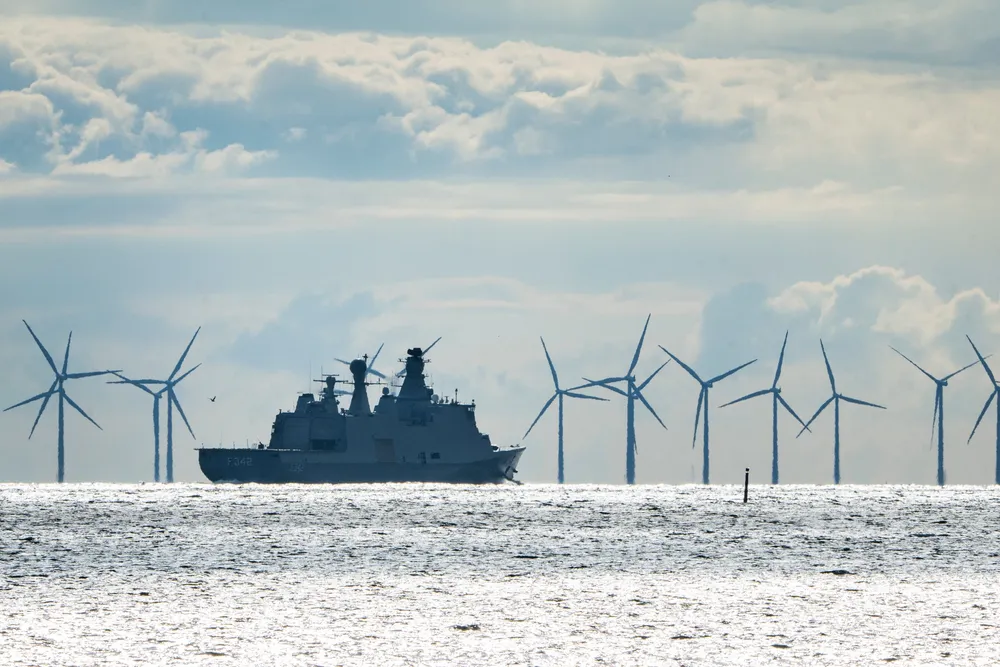'Count wind in Nato growth targets': military experts speak out
Former lieutenant general says renewables less vulnerable to attack than pipelines or power stations as governments urged to include wind and solar in defence spending

A group of European former military leaders has called on heads of government in Nato countries to end dependence on foreign oil and gas and incorporate renewable energy investment into defence spending to boost energy security.
In a letter co-signed by retired military personnel from Europe, they say renewable energy, not fossil fuels, should be the focus of increased investment.
“We must end our dependence on foreign oil and gas. Whether imported from Russia or elsewhere, a reliance on fossil fuels makes our countries less secure,” the letter said.
The letter notes that the EU has spent more than $105bn on Russian gas imports since the outbreak of the Ukraine war, an amount equivalent to 75% of the 2024 Russian military budget.
“To help unlock the investments needed to achieve energy sovereignty, and ensure we stop handing over billions of dollars a year to the Kremlin, we urge you to push for spending on renewable and low-carbon energy to be counted as part of the Nato 1.5% target,” the letter said.
Earlier this year, Nato members pledged to spend 3.5% of gross domestic product on “core defence requirements,” as well as an additional 1.5% of GDP on critical infrastructure, protection civil preparedness and resilience.
“You only need one missile to attack a pipeline,” Nugee said.
Security analysts say Russia is likely behind incidents of spying and cable-cutting as part of its hybrid warfare against Ukraine’s allies.
“We are waking up to the vulnerability of the subsea cables and pipelines,” Nugee said, noting the British Royal Navy’s deployment of its RFA Proteus vessel to protect critical undersea infrastructure as well as ongoing efforts to develop drones for monitoring purposes.
“The image of a battery-powered tank stopping to recharge on the battlefield should be enough to realise that fossil fuels are an essential part of defence for years to come,” Dieter Helm, professor of economic policy at the University of Oxford, said in an essay earlier this year.
“Add in all the manufacturing and ask how intermittent wind and solar will repower our armed forces to face the Russians.”
'False dichotomy'
But Nugee, a former non executive director for sustainability at the UK's Ministry of Defence, cautioned against “a false dichotomy”, between military spending and climate change action.
“We cannot afford to ignore the risk that climate change poses to our defence,” he said.
Reliance on fossil fuels makes Nato countries vulnerable to oil and gas price hikes, as witnessed following the outbreak of war in Ukraine, as well as supply interruptions, he argued.
“If you have 100% of your own energy then you become independent and create energy sovereignty,” said Nugee, who also authored the UK’s climate change and sustainability strategy that strives to make defence resilient to climate change.
Asked if increasing domestic oil and gas production could be an alternative route to reducing imports, Nugee argued that North Sea production was insufficient to meet demand, even when output was at its peak.
Nato members should instead ramp up renewable energy development as it would be faster and cheaper to build than the long lead time required for oil and gas exploration, Nugee said.
However, Nugee said the supply chain vulnerability could be minimised if wind turbine and solar panel manufacturing were brought to the UK. Such a move would also generate new jobs and create factories that could be deployed in a war effort if ever required, he said.
Despite the UK’s commitment to decarbonise power generation by 2030, renewable energy only accounted for 50.4% of total UK power generation last year, followed by gas-fired generation on 26.6%, nuclear on 14.8% and the remainder divided across imports, coal and non-renewable waste, according to government statistics.
Asked what would replace the gas supply currently required to support intermittent power sources such as wind and solar, Nugee said nuclear power provides a “fantastic baseload,” that could be complemented with imports from other countries around Europe.
Other signatories of the letter includes general Tom Middendorp, the Netherlands' former chief of defence, and air marshal Graham Stacey, former senior Royal Air Force officer and chief of staff of Nato Allied Command Transformation.
“The Nato 1.5% target presents an historic opportunity to incentivise investments in clean energy that will keep us safe, bolster our economies and help protect the planet,” the military leaders said.